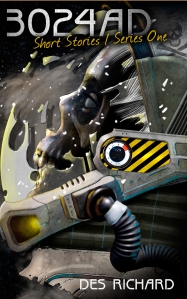I sat back, incredulous, believing only that my eyes deceived me. There was no way they were interpreting the light coming from my laptop correctly. Somewhere between that glowing screen and the synapses of my brain, the signal was jumbled. Maybe the problem lay deeper, I though, and clicked refresh. But there it was, plain as day.
Five stars.
Another one.
No. Way. Why? How? Who? Questions ran through my scrambled brain, trying to rectify the words I was reading to the apparent fact that they were about words I had written.
“best things from Indiana Jones, Star Wars, and Firefly“*
“A wonderful collection of characters and tales, seeded throughout with colorful snippets of “future history.”*
“skilled story-telling and imaginative world-building“*
“Humanities crowning achievement. A modern wonder of the world, surpassing the first seven.”**
They had to be talking about someone else. Not me. I had to know why. I gchatted my friend, Carey.
“You’ve been reading reviews again, haven’t you?”
Maybe.
“You’re an idiot,” she said, sending me a link to a ridiculous cat gif.
Really helpful. I pressed on in my righteous course. I had to find out who these people were and why they said these things. One of the reviews was from ‘Scott’, as if that would be his real name. I found him on Twitter, and from the looks of it, he likes sports (as if) and runs a blog where he gives thoughtful, balanced reviews to a lot of SciFi books. He even writes. Probably writing these nice reviews in order to get attention.
What a monster.
Maybe I’m crazy, I thought. Should I just leave it alone? But then- he lives not to far from here. An hours drive…
A couple minutes of Googling later, and I have his home and work address, phone numbers and a disturbingly descriptive account of an incident with a banana in grade school.
Obviously Carey was no help, so I tried Megan.
“Hey.”
“Don’t do it, you moron.”
“I haven’t even said anything yet.”
“Carey told me.”
“Already?”
“Yes. Don’t. Do. It.” More links to gifs, this one from that show, with the guy giving the side eye. Apparently it’s funny because his name is Dean.
They don’t understand. Don’t they get it? These reviews could make me. If people read them, they might buy my book, and I might make enough to write full-time. So I have to meet him. I have to know.
Maybe I should call first. Yeah, I’ll do that. The phone rings, his ringback tone is that damn Happy song, because of course it is.
“Hello?”
My blood is ice when he answers. What am I even going to say?
“Hi. Scott?”
“Yeah.”
The man’s nerve is not to be believed. He doesn’t even deny his online persona. Who does that? Monsters, that’s who.
“Hey, uh Scott. You write a book blog, right?”
“Yeah, I do.”
“What’s your review policy?”
He goes on about it for awhile, never even denying anything. He’s super pleasant the whole time.
The nerve of this guy.
“so, yeah, feel free to send it over. You have my email?”
Oh, I have your email, Scott.
The exchange rattles around in my brain for the next few days. I want more. I’m not satisfied. He needs to explain himself. I want him to say, “Yes, I’m Scott Whitmore and I gave your book five stars.”
I need to see him, face-to-face, man-to-man, and possibly several other arbitrary pairings. So it is, I am sitting in his driveway, holding my breath, ready for the exchange. I don’t know what I’m going to say, my mind is a cold London night in a fog as I walk up the drive. I exhale as my knuckles reach the door- the die is cast.
The door opens. It’s him.
“Hi, Scott,” I say.
“Do I know you?”
“It’s Dean.”
His face is blank. “You reviewed my book.”
“Oh! Hey! Yeah, man. I really liked it. What are you doing here?” I feel guilty for lying on the phone before. But I have to see it through,
“I… I wanted to know why.”
He looks puzzled. “I… I really liked it.”
Relief washes over me. “Oh. Cool.” What now? “How about the Mariners?”
“It was a fun season! Want a beer?”
Yeah, Scott. Yeah I do.
**NOTE: The people mentioned in this post are real, and are wonderful, and I don’t think Scott has a weird grade-school story involving a banana. Megan and Carey would send me gifs, tho**
*from real reviews of 3024AD.
**This one is not.



 2. Frankenstein, Mary Shelley. If nothing else, so people will stop calling Frankenstein’s Monster Frankenstein. But truly, because it is one of the best books ever written and says more about the dark side of humanity than any book on that YA list ever will.
2. Frankenstein, Mary Shelley. If nothing else, so people will stop calling Frankenstein’s Monster Frankenstein. But truly, because it is one of the best books ever written and says more about the dark side of humanity than any book on that YA list ever will. 7. To Kill a Mockingbird, Harper Lee. If I was going to tell a young person (I sound old) to read one book on this list, this is it. You will be hard pressed to find a book that makes a more profound statement- or one that provides more profound lessons- than this. Bonus points for the movie being equally powerful (DIGRESSION ALERT: this is why the YA list annoys me. The first book on the list aims for the same thing, but uses this as a lesson: “Good guys don’t do bad things”. Mockingbird shows us that it is wrong to harm or discriminate, particularly against the innocent and those less powerful than ourselves, and that we all bear a social burden)
7. To Kill a Mockingbird, Harper Lee. If I was going to tell a young person (I sound old) to read one book on this list, this is it. You will be hard pressed to find a book that makes a more profound statement- or one that provides more profound lessons- than this. Bonus points for the movie being equally powerful (DIGRESSION ALERT: this is why the YA list annoys me. The first book on the list aims for the same thing, but uses this as a lesson: “Good guys don’t do bad things”. Mockingbird shows us that it is wrong to harm or discriminate, particularly against the innocent and those less powerful than ourselves, and that we all bear a social burden) 8. 1984, George Orwell. Still the original and definitive dystopian novel, plus political lessons I’m guessing get left out of a lot of YA literature.
8. 1984, George Orwell. Still the original and definitive dystopian novel, plus political lessons I’m guessing get left out of a lot of YA literature.



